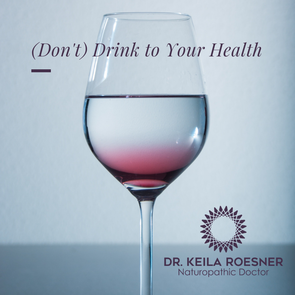 A glass of wine with dinner. A beer after a hard day of work. It’s not hard to integrate an occasional drink with a healthy lifestyle. Whole genres of music are written essentially about drinking (I come from a country music family!). In recent years, we’ve read that red wine is rich with antioxidants, and that an occasional beer can raise “good” cholesterol or stimulate lactation for breastfeeding mamas. But results from a new study suggest that even moderate alcohol consumption - the kind we tell ourselves is healthy - may actually be detrimental to our health. In other words, the much-heralded health benefits of drinking don’t outweigh the risks. As a result, there is no safe level of alcohol consumption. A recently published research study looks at data collected in almost 700 studies, spanning 195 countries and territories. Some of the findings are startling:
The authors of the study are firm in their conclusion: “By evaluating all associated relative risks for alcohol use, we found that consuming zero standard drinks daily minimizes the overall risk to health.” In other words, the only safe amount of drinks is none at all. This finding differs from many earlier studies, which often concluded that moderate drinking was the best approach. Why did this study reach a more decisive conclusion than previous examinations of alcohol’s effect on health? Several factors come into play. This study was careful to consider the ways they measured consumption. For example, researchers looked at regional variations in alcohol consumption that could be attributed to things like tourism. In addition, the study looked at alcohol’s impact on 23 different health-related problems. For some of those problems (such as heart disease), mild alcohol consumption had a positive effect. But that positive effect was balanced by a greater negative impact on other health issues (cancer is a strong example). What does this mean for you? If you drink, should you stop? Alcohol consumption is a very personal decision. This study looked at the big picture, worldwide. It was not studying individuals, but rather analyzing vast amounts of data previously collected, specifically looking at the risks for the 23 health issues. That data was conclusive. But it’s up to you how you apply it to your own life. This latest study can’t, for example, tell you if it’s OK to have some wine for New Year’s given your own unique genetics and other lifestyle factors. One thing is clear: If you’ve told yourself that drinking is healthy, you may want to reconsider that rationale. That doesn’t necessarily mean you must immediately quit. However in deciding whether or not alcohol is something you want in your life, it’s best to be realistic about the health risks. If you’re wondering about alcohol, talk to a healthcare practitioner. And be upfront about your drinking during the visit. Many people underreport how much they drink, but it’s best to be honest. You want to have an open discussion about all of your health concerns. Remember that healthcare providers aren’t looking to judge you: they want to work with you to create your best life. You also want to look at your own medical history and perhaps check out more specific studies. For example, another recently published study concluded that alcohol is the biggest controllable risk factor for dementia. If you have other dementia risk factors that are out of your control, such as a genetic history, you may want take action on the things you can control. Similarly, if you have a history of depression, consider alcohol’s impact on mental health. If you are trying to control your weight, the extra calories of alcohol aren’t going to help. Alcohol can also lower your judgment and keep you from making your best decisions. Alcohol intake may also increase your risk of estrogen dominance, and is a well-established risk factor for breast cancer. Some patients express frustration at the different results they see in health studies: One minute something is good for you, then suddenly we need to avoid it! Studies on alcohol use can be proof that when we read an eye-catching health-related headline, we need to look beyond the numbers. One thing to keep in mind is that the media will typically seize the most dramatic sound bite, although it’s impossible to always convey the nuances of a well-run scientific study in a short headline. For example, a news story doesn’t always mention who funded the study. For the record, the Lancet study on alcohol safety was funded by the Bill and Melinda Gates Foundation, while some others that emphasized alcohol’s benefits were funded by companies who sell alcohol. That doesn’t necessarily mean the studies are false, but we should all remember the funders have a vested interest in how the results are reported. Follow the money! As well, correlation doesn’t always equal causation. That’s sometimes hard to capture in reporting large studies. In fact there are studies that show that Resveratrol an antioxidant found in red wine is beneficial to your health however if you have other health issues like digestion.htmlpoor gut function, low energy, sleep issues and more, alcohol will likely have negative impacts and could make your health issues worse. One can absolutely gather the benefits of resveratrol by eating organic grapes with the skin on, rather than drinking wine, without negatively affecting other health issues - but that doesn't make for sexy headlines! Whenever you’re confused about a health issue, the best approach is to consider it from a sample study of one: yourself. That means talking to a healthcare provider about your own personal history and choices and your current health concerns. We can help you sort through all of the information you face every day and figure out what’s best for your unique body, in fact we are experts in doing just that! Book your complimentary Health Discovery Consult to discuss YOUR unique health goals. References
0 Comments
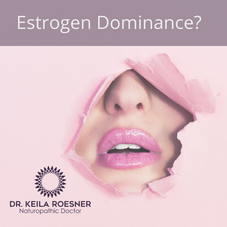 Estrogen – it’s not a dirty word. Estrogen plays an important role through the course of our reproductive lives and beyond. It regulates our menstrual cycle, strengthens our bones, controls our cholesterol, and much more. When our estrogen levels go “out of tune” we experience PMS or menopausal symptoms. But even before menopause, varying levels of this vital hormone can wreak havoc. That’s because estrogen requires a delicate balance with other hormones. When that balance is disturbed, we can experience a wide range of frustrating symptoms. This hormonal imbalance often occurs during a particularly busy time of our lives, the period from about age 25 through to menopause. As a result, our practice sees many women who are dealing with unexplained weight gain, mood swings, and libido problems. But there is help available. A few simple steps can help you restore balanced estrogen levels and feel like yourself again. How Do You Know if You Have Estrogen Dominance? Estrogen dominance can impact many areas of our lives, with symptoms that range from subtle shifts to major disruptions in wellbeing. Many women in this age group assume these issues are a normal part of aging or a consequence of their busy schedules. Just because it is common, does NOT make it a healthy normal! Even a slight imbalance in hormone levels can lead to a number of problems. Symptoms can vary greatly by person, but often include:
Does that list look familiar? I see many women in my practice each month with complaints like these. I totally understand how frustrating they can be, especially when you’re unable to find effective treatment. And, of course, the complex relationship between estrogen and our emotions can only magnify the frustration. Who wants to feel irritated about feeling irritable? It’s not only women who can experience estrogen dominance. You may be surprised to know that men can suffer an excess of estrogen as well. In men, estrogen dominance can manifest a bit differently, with some of these symptoms being common:
What Causes Estrogen Dominance? To understand estrogen dominance, we have to consider the role of another important hormone, progesterone. Progesterone and estrogen maintain an often tricky seesaw in our bodies. Prior to menopause, the balance shifts at different stages of the menstrual cycle. Estrogen dominance isn’t necessarily a surge of estrogen, but an imbalance in that seesaw. Simply put, estrogen dominance happens when the seesaw tips to one side because there is not enough progesterone to balance out the estrogen. There’s actually no “set” number we can measure that proves an estrogen dominance diagnosis. It’s the overall hormonal profile that is important – the DUTCH test is an extremely valuable tool that I use regularly for assessing this balance. How does estrogen become dominant? A key factor is the timing. Or, to be more specific, the time of our lives. Consider a normal menstrual cycle during our reproductive years: After we ovulate mid-cycle, our bodies produce progesterone to balance out estrogen. But as we near menopause, we often have some menstrual cycles when we do not ovulate. As a result, there is not enough progesterone to balance out the estrogen. Enter estrogen dominance -- and its long list of possible symptoms. To a certain extent, estrogen dominance is a natural part of our aging process. However, recent years have seen a rise in estrogen-dominance complaints, and our busy lifestyle may be a big factor. Environmental and behavior issues can increase estrogen levels, tipping the seesaw even further. What’s to blame? Take a look at this list.
How Can You Restore Hormone Levels? Our practice can work with you to re-balance your hormonal havoc. Starting with an accurate diagnosis, we can create a lifestyle plan that works for you. As a starting point, these changes are recommended:
Do the estrogen dominance symptoms sound a bit too familiar? Please contact our clinic and we’ll get to the bottom of what’s going on and create a plan of action to bring your body back to good health. References 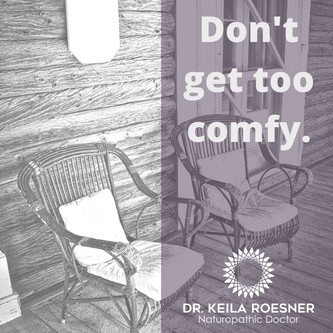 On average, how many hours a day do you spend sitting, uninterrupted? One hour? Two hours? Three…or more? Our ancient ancestors spent much of their time on the move, hunting and gathering to serve their basic needs, as well as more play and family time. Obviously, the balance between movement and fuel has shifted dramatically over time, most notably since the technological revolution. Unlike our ancestors, we no longer search for food. Instead, we are now on a quest for time, as hours fly by while we’re hunched over a keyboard. On an average day, many of us are likely sitting more than we are moving and consuming more calories than we are burning. Many of us regularly put in eight-hour workdays seated at a desk – sometimes even more. We get headaches and neck tension and need to see our massage therapist more often. We then go home and unwind on the couch, binge-watching our favourite shows. The hours begin to add up. Maybe we make a little time to fit in some exercise each day; however, with more conveniences at our fingertips, we can do a lot more while moving a lot less. The longer we sit, the more our bodies begin to feel tight, tired and sore. It’s clear that too much sitting isn’t good for us. But did you know that it can even lead to earlier mortality? Sitting and Premature Death That’s right…too much sitting can kill you! In fact, some are saying that “sitting is the new smoking” because its impact is so significant. According to recent research from the Journal of the American Heart Association, prolonged sitting presents similar health risks as smoking, such as heart disease, lung cancer, and diabetes. It also increases premature death by about 50 percent! Even more surprising, too much sitting increases your risk for an early death regardless of your fitness level or other lifestyle habits. You simply cannot undo hours of sitting with a 20 minute walk (although you should still keeping walking). But sitting isn’t just bad for your heart or metabolism; it is also bad for your brain! Researchers at the University of California have discovered a connection between sedentary behaviour and thinning regions in the brain that is critical to new memory formation. So, what if your job requires you to be at a desk, all day, every day? Are you supposed to quit? Well, of course, that’s not practical. However, there are a few simple things you can do to ensure that you keep your body regularly moving for a longer, healthier life. Tips to Sit Less & Live Longer
Do you spend excessive amounts of time sitting? Do you experience any health problems that you think could be related to a sedentary lifestyle? Let’s chat and get to the root of your health issues. Book an appointment with our clinic, and together we will find ways to improve your overall health and well-being so that you can live your life to its fullest. Call 519-275-2187 ext. 7 or Book Online to get started. In health, Dr. Keila Roesner BHSc ND
References:
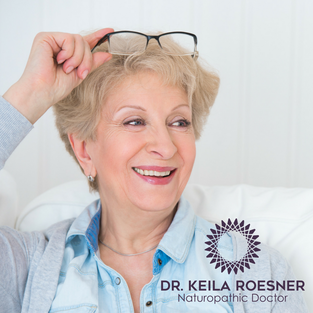 Pain, swelling, redness, immobility and heat -- these are all common signs of inflammation with injuries or an infection. Chronic inflammation also occurs inside our body and can present itself in other ways. When inflammation triggers sensory nerve endings, it can result in symptoms such as fatigue, rashes, and chest, abdominal and joint pain. What is Inflammation? Inflammation is a natural function with a bad reputation. It’s a word most of us associate with pain, discomfort and poor health -- yet its ultimate purpose is actually to help us. Without inflammation, injuries could fester and infections could become deadly. When the body is injured, inflammation is a signal to the immune system to send white blood cells so the healing process may begin. Unfortunately, when inflammation continues on for too long, it can potentially trigger numerous other chronic health issues in the body including cancers, depression, food sensitivities and asthma. In fact, some say inflammation is the “new cholesterol” due to its direct link to heart disease. In some cases, inflammation occurs when the immune systems revolts against us and attacks our own bodies. Autoimmune diseases include rheumatoid arthritis, type 1 diabetes, IBD, among dozens of others. There are over 80 different autoimmune diseases. Top Tips to Reduce Inflammation First, let’s take a quick look at inflammatory foods that you definitely don’t want to put into your body. You probably already know all the usual suspects by name – sugar and artificial sweeteners, fried foods and saturated fats, processed meats and grains, dairy, caffeine and alcohol. These foods can disrupt gut bacteria, spike insulin levels, and bolster inflammation. Identifying and eliminating your food sensitivities via IgG Blood testing or an elimination diet can be a very helpful next step. Wondering what those anti-inflammatory foods are? The good news is they are delicious. 1. Eat Raw, Organic Fruits & Veggies Organic foods are a great place to start when looking to adhere to a more anti-inflammatory diet. Grown in mineral-dense soil, organic foods tend to be more alkalizing and have a higher vitamin and mineral content. In order to keep those vitamin and mineral levels high, it’s also helpful to eat raw fruits and veggies, which are also known as life-giving foods. Cooking can deplete minerals, which is why it’s important to take every opportunity you can to get eat fresh and raw so you get to enjoy the full nutritional benefits. For example, Vitamin K is found in dark leafy greens like broccoli and spinach, and is excellent for reducing inflammation. 2. Add in lots of Alkaline foods In addition to fruits and vegetables, nuts and legumes are also alkaline foods that can help balance your pH and reduce acidity. While being mindful of your body’s pH, you might be wonder about the impact of acidic foods, like tomatoes or citrus, and how they affect inflammation. Surprisingly these foods don’t create acidity in the body. Instead they may actually help to restore your pH balance. Even apple cider vinegar is alkaline-forming (however, other vinegars are not). 3. Fish & Plant Proteins Believe it or not, most high protein foods, like meat, can actually be acid forming. In this case, plant proteins, such as almonds and beans, are great alternatives to reduce acidity and inflammation. Need your meat? Then eat more fish. Fish oils, as well as other foods rich in healthy fats like omega 3, are proven to have a variety of health benefits, including significant anti-inflammatory effects. Fish is also a great source of Vitamin D. Vitamin D deficiency has been associated with a wide range of inflammatory conditions. Grass-fed meats are a good option if you prefer red meat, due to their higher concentration of conjugated linoleic acid and omega 3s. 4. Antioxidant-Rich Foods Those susceptible to chronic inflammation may also benefit from supplementing their diets with food sources that contain bioactive molecules. For example, curcumin is the compound found in turmeric root that gives curry its bright yellow color. A powerful antioxidant, curcumin’s ability to reduce brain inflammation has been shown to be beneficial on both Alzheimer’s disease and major depression. Curcumin has been shown to not only prevent memory problems from worsening, but also to improve them. Complement your curry with a little watercress salad on the side, including pears, dill weed, onion and chives – all sources of the antioxidant known as isorhamnetin. Add a little red wine and some berries for dessert, which are rich in resveratrol, and you’ve got yourself an anti-inflammatory party. Resveratrol is an antioxidant produced by certain plants in response to injury or when under attack by bacteria or fungi. This is what makes dark-coloured grapes and berries such excellent health boosters for your body. And of course, you can’t forget the dark chocolate! The flavonoids found in cacao are extremely potent antioxidants and anti-inflammatory agents, which are great for your brain and your heart. New research also shows that consuming dark chocolate with a high concentration of cacao (minimum 70% with 30% organic cane sugar) has a positive effect on stress levels and inflammation, while also improving your memory, immunity and mood. You read that right – chocolate really is good for you (but make sure its good quality and that you are not over doing it). 5. Going Beyond Diet- get your stress in check! While diet definitely plays a role, stress is also a major contributor to inflammation in the body. Stress can be triggered by lack of sleep, lifestyle changes, or any other number of factors. Getting a good night’s rest and making time to meditate or practice other stress-reducing activities, like yoga or Tai chi, are also very effective ways to promote good health and reduce inflammation. All it takes is a few conscious decisions about your diet and lifestyle and you are on your way to a healthier you.
Please feel free to contact our clinic and we can find your best solutions together. Call or book your complimentary Health Discovery session at 519-275-2187 ext. 7 or book online. In health, Dr. Keila Roesner BHSc ND
References
 Menopause and thyroid dysfunction: one is inevitable for women (if we are lucky to live that long) while the other is common. Both affect millions of women every year. The thyroid gland, which sits low in the neck, is considered one of the master hormone glands in the body and affects everything from our metabolism, cardiovascular function, the immune system, digestive health, mood and our body’s stress response. The thyroid especially affects our sex hormones. Menopause typically occurs for most women in their late 40s to early/mid 50s but can also be surgically or medication induced and involves dramatic changes to our sex hormones such as testosterone, estrogen, progesterone, DHEA, and cortisol. As these fluctuate many women start to experience symptoms that we commonly associate with menopause: mood swings, hot flashes, irregular or heavy menses, vaginal dryness and changes in hair and skin. Because these symptoms frequently occur, it is easy to confuse “common” with “normal” and chalk it all up the change. Not so fast. The thyroid gland acts like the thermostat of the body and is particularly vulnerable under times of stress. Major stressors like giving birth and being post-partum, being a student, mid-life, post-illness or surgery often coincide with major hormonal transitions like pregnancy, puberty, and menopause. When our body is under stress our thyroid gland kicks in to either rev us up or slow us down if we are in danger of burning out. Living a fast-paced life, many of us become susceptible to both sex hormone imbalances and thyroid disturbances. If our sex hormones are imbalanced, our thyroid function will be affected and vise versa. For example, depression, weight gain (particularly around the middle), scalp hair loss, body hair growth, menstrual irregularities, poor concentration, osteoporosis, fatigue, insomnia and low libido are common to both hypothyroidism (low thyroid function) and menopause. Since these patterns tend to be related to stress, it’s crucial to practice stress-reduction techniques and self-care (check out my Calm the F Down Self Care guide here), exercise and eat healthily. More importantly, however, we must determine the cause of these symptoms: poor thyroid function? Sex hormone imbalance? Both? Rather than spending time chasing your tail and taking unnecessary medications, it makes much more sense to determine the root cause of your symptoms. Getting a proper assessment is critical in establishing YOUR best course of action. In particular, I find the DUTCH Hormone test and a complete thyroid panel especially helpful. You may also want to look into these other tests for fatigue and hormonal imbalance. Often bioidentical hormone replacement therapy can be a game-changer for women throughout the peri-menopausal years and beyond to help restore quality sleep, balance moods and reduce heavy bleeding. Thyroid and hormone imbalances are common and can be improved when working with a Naturopathic Doctor as part of an individualized treatment plan to age gracefully with plenty of energy as you enter this exciting time of life. Sound like you? Have questions about your thyroid or hormones? Book a complimentary Health Discovery Session with me to chat more about your options. In health,
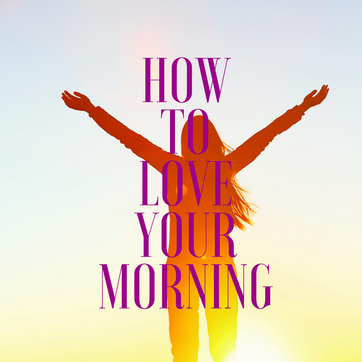 Creating a strong self-focused morning routine is one of the most important things you can do to set the tone for your day. Do you find yourself checking your email first thing in the morning and mentally answering questions… hours before you get into work? Rushing around in the morning, cramming breakfast in your mouth as you drive to work, already feeling that sense of impending anxiety and wishing you had more time for yourself? Feeling like your day is happening to you? Me too. Or rather, I used to feel that way. As an entrepreneur, I am more than a little obsessed with time management and productivity. As a Naturopathic Doctor, I am all about helping people create systems in their life to reach their health goals so that they can be more successful at work, and be the parent/partner/person they dream of being. I fell into the habit of auto-piloting my mornings, basing my schedule around when my husband needed to leave for work (ridiculously early), other roommates’ schedules and how much time I could spend falling into the black hole that is my Facebook Newsfeed. I would fly into the office just a few minutes before my first client, feeling a frazzled and unsettled. It is a recipe for anxiety and unproductivity. You feel like you are constantly chasing your tail and wind up frustrated by your lack of accomplishment at the end of the day. You stay up late catching up… or watching Netflix and always feeling perma-tired. Recently, I’ve been experimenting with a new “system”. Most successful entrepreneurs, top earners (C-office types) and the calmest people I know get up early. As a night-hawk born of two musicians, this concept is totally alien to me. I’ve gotten into the habit over the past few years, however, due to my husband’s schedule and the desire to spend time together before the day gets crazy. It’s actually very peaceful to be up and moving before the rest of the world. Once I’m up, I never regret it. Enter the Morning Triathlon: a super efficient start to the day to help you feel healthier, happier and more successful. Here’s why it works: By starting your day focusing on YOUR needs, you set a strong foundation for the rest of the day. Your email inbox and work day are full of other people’s demands for your time and energy… but by starting and ideally ending the day focusing on yourself, you will feel calmer and more productive. I call this concept “book-ending”. Ie. You book-end your day getting in the right frame of mind for your day in the morning, and then winding down in the evening. Here’s how you do it: Figure out how much time you have, and divide into three blocks: Mental, Movement, Mindful/Meditate. This is your Morning Triathlon. Ideally you have about 15 minutes or longer. Skip the time you spend reading the news on your phone.
My morning routine starts like this:
Some days I use a 15 minute block of time, other days I have longer. I never regret getting up early or taking care of myself. Self-care is vital to your health. Get my NEW Guide Calm the F*** Down: 5 Proven Strategies to Take Care of Yourself In my next blog post, I’ll share with you my favorite ways to build the perfect bedtime routine to help ward off insomnia. What are YOUR favorite ways to start your morning? Comment below! In health, Dr. Keila Roesner BHSc ND
 This week a regular patient of mine and I were chatting and she said: "But Keila, I don't have time to exercise, and take my vitamins, meditate, walk, stretch, journal or any of that stuff!". This also wasn't the first time I'd heard this phrase. Often, it's me saying it in my own head. Maybe you've got stuck in the "Busy" trap. It sounds something like, "So, what've you been up to?" "I've just been soo busy!". Newsflash: We're all busy! We're all stressed! This bouncing around from one activity to the next is exhausting. We end up eating on the run, not exercising, becoming sleep deprived and getting short with our loved ones. It is no big secret that stress is associated with insomnia, anxiety, depression, heart disease and even periodontal disease. Yet, we become addicted to that feeling of being indispensable, needed and useful. While the notion of "self-care" may seem self-indulgent to some, really, it's a lifeline. Creating a plan for self care is really about creating practices that benefit your well-being, be it socially, emotionally, spiritually, physically, mentally or financially. Taking time out for yourself allows you to show up more effectively, confidently and rested in the rest of your life. It's about self-preservation. I like to break down self care into three parts: 1. Physical. This should include some daily movement, regular visits with your health care providers, healthy balanced meals, water, plenty of sleep. 2. Mental. Getting things off your chest via talking to someone, journaling, creating a plan. 3. Emotional. Spending time alone to process, as well as being social. Finding an outlet for our emotions that is constructive. I often recommend that my patients create a list of activities that they can do to take care of themselves, from each of these categories.. and then schedule some Non-Negotiable Time with themselves to do some of them on a regular basis. Scheduling is key. Treat it like any other commitment and show up on time. Here are some basics to get you started: 1. Take a 30 minute walk outside, alone or with a friend 2. Turn off the TV, phone and computer 3. Take yourself out for lunch or a coffee 4. Read a book for fun 5. Work out 6. Yoga 7. Call up a friend to catch up 8. Prioritize sleep. Set a regular bedtime and waking time. 9. Spend less time with people that drain you 10. Take a class, join a choir or a team If we can't set aside time for self-care, then we really have to look at our priorities. What can we delegate, or let go of? Really, if we can't care for ourselves, what's the point? The question isn't about not having the time or being able to afford to take care of ourselves. It's about using the precious time we have because we can't afford not to take care of ourselves. Naturopathic Medicine is really all about self care. As a physician, I teach people how to take good care of their bodies and minds, whether it is improving their diet, getting good quality sleep or acting as a sounding board. In many cases, a combination of herbs, supplements and acupuncture can do wonders for that sense of burnout. That same feeling that can drive us towards disease. The bottom line: can you afford to feel sick, tired, and burnt out? I know I can't. If you are interested in improving your energy, getting a good night's sleep and feeling better, you can schedule a free health strategy session with me here. In health, Dr. Keila Grab your FREE copy of my Calm the F Down Self Care Guide here. 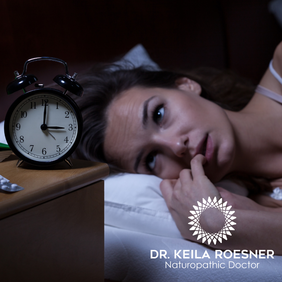
It was 2 pm and I was sitting in my first year physiology class at the Canadian College of Naturopathic Medicine.
I knew that it was important to stay awake but the more I tried to focus on my professor's words, I Just. Kept. Falling. Asleep. It felt so good, telling myself that I would just rest my eyes while listening to how the kidneys are supposed to work. Unfortunately I would wake with a gasp about every two minutes. I always blew my cover. I had told myself that I was just tired, that I didn't need to see anyone. I knew I didn't want the zombie pills that many of my family members were taking, you know, being a first year Naturopathic student and all. I needed help. That was the first time that I consulted a Naturopathic Doctor. Insomnia is one of the most common reasons for people to seek health care. Indeed, the vast majority of the patients I see have some sleep issues and are sometimes surprised to be told that they have insomnia. People with insomnia often have difficulty either falling or staying asleep, wake up too early and may feel un-refreshed in the morning. Insomniacs are also more likely to develop depression, anxiety, high blood pressure, heart disease, insulin resistance, diabetes, be overweight or obese, report substance abuse, have poorer cognitive performance and memory and take sick days from work. In other words, many of us are not sleeping and it is a problem. So what did I do? I learned the hard way. I know what it is like trying to function when you need to be at your best...and failing. I also learned that a few simple hacks can make all the difference. The Essentials for Good Sleep and Preventing Insomnia, Naturally:
If after implementing all of these measures consistently you are still having trouble sleeping, know that there are many options to help support you. As a Naturopathic Doctor, my role is to help identify the factors that may be contributing to your poor sleep, and helping you to create a treatment plan that is tailored to suit your lifestyle. I use a combination of therapies with great success to get my patients sleeping well. If you are interested in how I can help you, you are welcome to book a Health Discovery Session with me. I have helped many people, just like you, to get a good night's rest naturally. And me? I sleep like a baby now. |
Top 75 Naturopath Blogs & Websites For Naturopathic DoctorsAuthorDr. Keila Roesner is a Naturopathic Doctor. When not treating patients she is also an enthusiastic barefoot-strolling, music-loving, yoga-doing kitchen wiz - who also happens to be a wrestling fan. Categories
All
|
Let us take you from hormonal to whole.
|
Dr. Keila Roesner, BHSc ND
Naturopathic Doctor, Hormone Warrior and Your Wellness Cheerleader 247 Church Street, Stratford ON N5A 2R7 (519) 273-0900 [email protected] |
|










 RSS Feed
RSS Feed